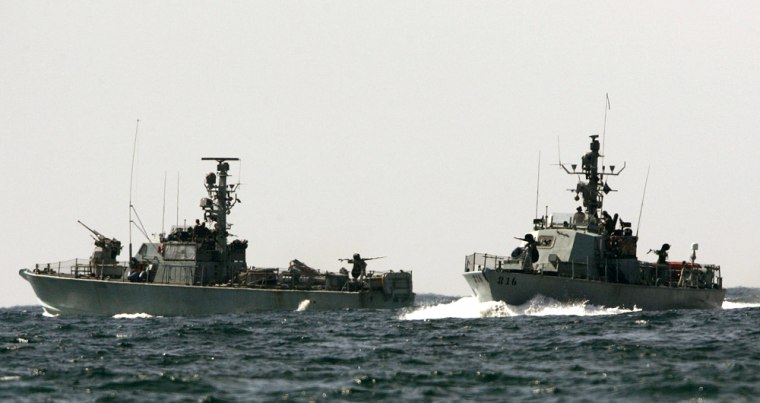Israel's nearly 2-month-long air blockade of Lebanon ended Thursday, bringing relief to Lebanese. But it maintained its seal on the country's port amid a wave of opposition in Israel against lifting the restrictions.
The continuing of the sea blockade was a last minute change, after Israel announced a day earlier that it would end the entire cordon. Israeli officials said Thursday that the naval blockade will continue until a U.N. force can take over to prevent weapons shipments to Hezbollah.
Signaling the resumption of normal air traffic, a commercial flight by Lebanon's national carrier Middle East Airlines circled over downtown Beirut three times at 6:04 p.m., four minutes after the embargo ended, in a ceremonial show.
The plane, coming from Paris, then landed at Beirut's airport. It taxied down the runway as someone in cockpit waved a large red-and-white Lebanese flag, with its distinctive green cedar tree emblem, out a window. It was followed by a Kuwait Airways plane, which also hung a Lebanese flag out its cockpit window.
It was a moment of joy for war-stricken Lebanese, who complained that the blockade crippled their country, which imports nearly everything. Business leaders said it cost Lebanon about $50 million a day.
Test for peacekeepers
But the Israeli government was buffeted by anger from the military and the families of two captured Israel soldiers, whose abduction by Hezbollah guerrillas sparked the 34-day offensive against Lebanon. They argued that the end of the blockade would open the doors for Hezbollah to rearm and took away negotiating leverage for winning the soldiers' release.
Israel had refused to end the restrictions until an international force was in place to prevent arms smuggling. Israel on Wednesday announced the lifting assurances from the United States that international forces were ready to help monitor the air- and seaports.
It will be the first test for the U.N. peacekeeping force's ability to keep out weapons.
Germany is to post customs and border police experts at the Beirut airport to help monitor traffic through the facility. German Foreign Minister Frank-Walter Steinmeier arrived Thursday with the first group of experts to consult with Lebanese authorities.
German naval forces are also to patrol the coast. The ships were expected to arrive off Lebanon within two weeks, and until then Italian, French, British and Greek warships will patrol.
But Israeli officials on Thursday suggested the naval force was not ready to take up the job and said the blockade on ports would remain.
"The aerial blockade has been removed. In coordination with the United Nations, the naval blockade will continue until the international naval force is in place," said Miri Eisin, spokeswoman for Prime Minister Ehud Olmert.
Israeli officials said the United Nations was still working out logistical issues, and they expected the problem to be resolved within 48 hours. They said Israel is ready to transfer responsibility as soon as the international force is ready.
The officials spoke on condition of anonymity because the issue was an internal U.N. matter.
The militant Shiite group is widely believed to have received weapons and other support from its backers Syria and Iran.
The lifting of the blockade came after lengthy negotiations personally led by U.N. Secretary General Kofi Annan involving Israel, Lebanon and Western nations.
Return to normal
Thousands of Lebanese families who fled the fighting are expected to now return home before the start of the country's school year next month.
The blockade hampered rebuilding efforts after the Israeli offensive that killed hundreds of Lebanese, destroyed thousands of homes and ravaged bridges and other infrastructure. At one point the blockade caused severe fuel shortages in Lebanon, leading to long lines at gas stations and forcing the electric company to ration power.
But in recent weeks, some supply ships had been allowed to dock after coordinating with Israel, easing the fuel crisis and allowing the electricity authority to lift some rationing.
Israel had also been allowing aid flights into Beirut's airport, as well as commercial flights by Middle East Airlines and Royal Jordanian, but only coming from Amman, Jordan, an Arab country that has a peace treaty with Israel.
On Thursday, workers at Rafik Hariri International Airport began at first light Thursday preparations for full resumption of operations. The giant electronic board announcing flights arrivals and departures was lit up and taxis began filing in. The three runways had been repaired since the cease-fire took effect Aug. 14.
Air France was expected to send its first flight Friday morning from Paris to Beirut and the country's transportation minister was to be on board.
Airlines from around the Arab world planned to resume flights Friday or Saturday, and Lufthansa, the German airliner, said it was closely monitoring the situation and expected to act soon.
Olmert under fire
In Israel, the families of the abducted soldiers were to meet Thursday with Prime Minister Ehud Olmert to express their concerns that without the blockade, Israel would give up a card to play in negotiations.
Olmert has faced a storm of criticism over his government's handling of the war, widely seen to have ended in success for Hezbollah, which stood up to more than a month of punishing Israeli bombardment.
Annan has said he would appoint a mediator for indirect talks between Israel and Hezbollah on the release of the soldiers, raising the possibility of a prisoner swap.
Russian Foreign Minister Sergey Lavrov Thursday met Lebanese leaders in Beirut and stressed on the implementation of the U.N. cease-fire resolution and the release of the Israeli soldiers before traveling to neighboring Syria, a close ally.
British Prime Minister Tony Blair was expected to make a stop on the weekend during a Mideast tour, Lebanese media reported.
